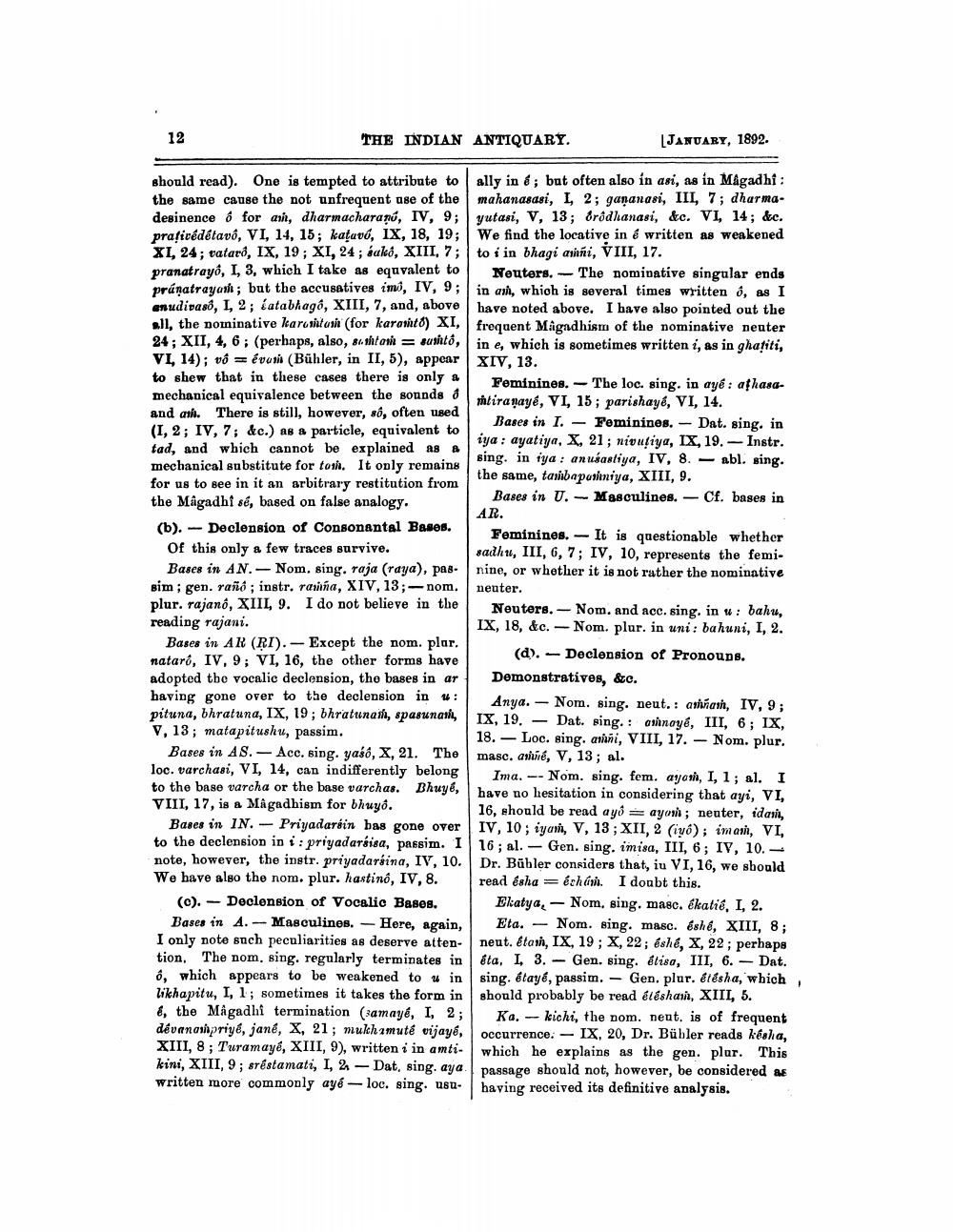________________
12
THE INDIAN ANTIQUARY.
JANUARY, 1892.
T 17.
should read). One is tempted to attribute to ally in &; but often also in asi, as in Magadhi : the same cause the not unfrequent use of the mahanasasi, L, 2; gananasi, III, 7; dharmadesinence 6 for an, dharmacharanó, IV, 9; yutasi, V, 13; 8rôdhanasi, &c. VI, 14; &e. praficédétavó, VI, 14, 15; katavó, IX, 18, 19; We find the locative in é written as weakened XI, 24; rataró, IX, 19; XI, 24 ; sako, XIII, 7; to i in bhagi anni, VIII, 17. pranatrayó, 1, 3, which I take as equvalent to Neuters. - The nominative singular ends pránatrayari; but the accusatives imi, IV, 9; in am, which is several times written /, as I anudivas8, 1, 2; íatabhagô, XIII, 7, and, above have noted above. I have also pointed out the all, the nominative karotitori (for karanto) XI, frequent Magndhism of the nominative neuter 24; XII, 4, 6; (perhaps, also, shtoni = sunto, in e, which is sometimes written i, as in ghatiti, VI, 14); vô = évun (Bühler, in II, 5), appear XIV, 13. to shew that in these cases there is only a
Feminines. The loc. sing. in aye: athasamechanical equivalence between the sounds o
miranayé, VI, 15; parishayé, VI, 14. and ath. There is still, however, só, often used
Bases in I. - Femininos. - Dat. sing. in (I, 2; IV, 7; &c.) as a particle, equivalent to
iya : ayatiya, X, 21; nivutiya, IX, 19. - Instr. tad, and which cannot be explained as a
sing. in iya: anusastiya, IV, 8. - abl. sing. mechanical substitute for toit. It only remains
the same, tambaparimniya, XIII, 9. for us to see in it an arbitrary restitution from the Magadhi se, based on false analogy.
Bases in U. Masculines. - Cf. bases in
AR. (b). - Declension of Consonantal Bases.
Feminines. - It is questionable whether Of this only a few traces survive.
sadhu, III, 6, 7; IV, 10, represents the femiBases in AN. - Nom. sing. raja (raya), pag- nine, or whether it is not rather the nominative sim; gen. raño; instr. rariña, XIV, 13;- nom. neuter. plur. rajano, XIIL 9. I do not believe in the
Neuters.- Nom. and acc. sing. in : bahu, reading rajani.
IX, 18, &c. - Nom. plur. in uni : bahuni, I, 2. Bases in AR (RI).- Except the nom. plar.
(d). - Declension of Pronouns. nataró, IV, 9; VI, 16, the other forms have adopted the vocalic declension, the bases in ar Demonstratives, &c. having gone over to the declension in :
Anya. - Nom. sing. neut. : ariñan, IV, 9; mituna, bhratuna, IX, 19; bhratunach, spasunatit, IX. 19. - Dat. sing. : annoyé, III, 6; IX, V, 13; matapitushu, passim.
18. - Loc. sing. arini, VIII, 17. - Nom. plur. Bases in AS.- Acc. sing. yaso, x, 21. The
masc. aré, V, 13; al. loc. varchasi, VI, 14, can indifferently belong Ima. --- Nom. sing. fem. ayam, I, 1 ; al. I to the base varcha or the base varchas. Bhuye, have no hesitation in considering that ayi, VI, VIII, 17, is a Màgadhism for bhuyo.
16, should be read ayo = ayoni; neuter, idari, Bases in IN. - Priyadarsin has gone over IV, 10; iyan, V, 13; XII, 2 (ivo); imanir, VI, to the declension in i : priyadaráisa, passim. I | 16; al. - Gen. sing. imisa, III, 6; IV, 10. - note, however, the instr. priyadarsina, IV, 10. Dr. Bübler considers that, iu VI, 16, we should We have also the nom. plur. hastino, IV, 8. read ésha = échán. I donbt this.
(c). - Declension of Vocalic Bases. Ekatya, - Nom. sing. masc. ékatie, I, 2. Bases in A. - Masculines. - Here, again, Eta. - Nom. sing. masc. éshé, XIII, 8; I only note such peculiarities as deserve atten- neut. &tam, IX, 19; X, 22; éshé, X, 22; perhaps tion. The nom. sing. regularly terminates in éta, I, 3. - Gen. sing. étisa, III, 6. - Dat. ô, which appears to be weakened to u in sing. étayé, passim. - Gen. plur. &tésha, which likhapitu, I, 1; sometimes it takes the form in should probably be read &léshan, XIII, 5. &, the Magadhi termination (samaye, I, 2; Ka. - kichi, the nom. neut. is of frequent dévanapriyé, jane, X, 21; mukhamuté vijayé, occurrence. - IX, 20, Dr. Bübler reads késha, XIII, 8; Turamayê, XIII, 9), written i in amti. which he explains as the gen. plur. This kini, XIII, 9; sr@stamati, I, 2 - Dat, sing. aya passage should not, however, be considered as written more commonly ayé -- loc. sing. usu having received its definitive analysis.




